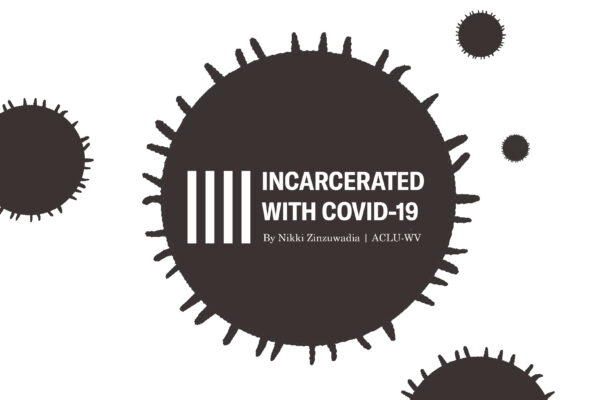By Nikki Zinzuwadia
By June 1, the West Virginia Division of Corrections and Rehabilitation reported that 119 inmates and eight staff members at Huttonsville Correctional Center (HCC) in Randolph County had tested positive for COVID-19. These results come after all prisoners and employees were tested at the facility. HCC has 1,090 prisoners, indicating nearly an 11 percent infection rate among inmates.
Five more residents in the surrounding community were also confirmed positive May 27. As a result, free COVID-19 testing is now being offered in Randolph County to evaluate possible community spread. While all community-based tests have been negative so far, these measures remain important in minimizing the risk of an outbreak and should not be relaxed.
The sudden emergence of COVID-19 infections in rural Randolph County comes only two weeks after the first incarcerated individual at HCC tested positive on May 19. As the crisis at HCC shows, massive coronavirus outbreaks have the potential to quickly spread and impact public health both inside and outside correctional settings. They can pose severe threats to the health of incarcerated people, prison staff, and the general public as correctional healthcare workers travel and asymptomatic inmates are released.
In fact, the Elkins-Randolph County Health Department reported only some of the inmates at HCC presenting symptoms, while most were asymptomatic. This data aligns with a recent study published by the Prison Policy Initiative. It found that, in U.S. correctional facilities with universal testing, significantly more asymptomatic people are testing positive for COVID-19.
State prison systems in Arkansas, North Carolina, Ohio and Virginia found that 96 percent of 3,277 positive inmates were asymptomatic after implementing mass coronavirus testing. Recent results from two women's correctional facilities in Louisiana revealed 210 asymptomatic coronavirus cases out of a total of 317 positive inmates.
According to the Centers for Disease Control and Prevention (CDC), asymptomatic individuals can greatly contribute to the onset of COVID-19 outbreaks. Given the high-risk population and how quickly the novel coronavirus can spread within jails and prisons, it is paramount to coordinate mass periodic COVID-testing in these facilities. Offering universal testing will play a critical role in identifying cases among incarcerated individuals and workers, and preventing further disease transmission.
Due to the recent developments in Huttonsville and Randolph County, Gov. Jim Justice pledged to test all inmates and staff across West Virginia’s corrections system during a press briefing last week. Previously, state officials were only testing those in the corrections system who showed symptoms of COVID-19.
Justice assures that the state has enough testing capability to implement mass COVID-19 testing within its jails, prisons, and juvenile services facilities; a current system with about 14,000 inmates and workers. An important initial step, this announcement will play a critical role in placing West Virginia’s prison system at the forefront of the state’s coronavirus response effort.
Testing has begun at facilities in the Eastern Panhandle and will continue throughout the state over the coming weeks. As of June 5, three additional inmates and one more employee in various jails and prisons have tested positive for COVID-19. During a press briefing earlier this week, Governor Justice stated that comprehensive testing across West Virginia’s corrections system will conclude by June 12.
Prior to these announcements, testing procedures were lacking in incarcerated settings throughout the state. According to data provided by the West Virginia Division of Corrections and Rehabilitation on June 1, aside from HCC, only 48 total tests had been conducted throughout the other ten state prisons, 95 in ten regional jails, two in three community corrections facilities, and five in ten juvenile detention centers.
The call for universal COVID-19 testing in prisons, jails, and juvenile detention centers in West Virginia began earlier on in the pandemic. In a letter to state officials on April 27, a coalition of various advocacy organizations, including the ACLU of West Virginia, requested the state to distribute testing resources for all inmates and employees as supplies become available.
On May 9, the West Virginia Division of Corrections and Rehabilitation (DOCR) responded by highlighting the state’s inadequate testing capacity and inability to administer universal testing in incarcerated settings. Strangely, the DOCR letter also attacked the coalition for “conjuring” a “noxious climate” in its advocacy. Within a few weeks, and following the coronavirus outbreak at HCC the coalition had been warning of, state officials have finally started implementing plans for universal testing within West Virginia’s jails, prisons, and juvenile detention centers.
Mass COVID-19 testing in our correctional facilities is an incomplete answer to how to reduce disease spread within our incarcerated populations and surrounding communities, but it is part of the solution. Positive change will be contingent upon the actions taken by West Virginia’s government during the coming weeks.
According to recent studies by the Marshall Project, only a handful of states have expanded universal testing efforts into their correctional facilities. Many prisons across the country are still only testing people who show symptoms or not testing at all. This suggests that there may be a serious undercount of coronavirus infections in the United States.
Without a commitment to prioritize robust testing efforts in America’s jails, prisons, and juvenile detention centers, we will continue to underestimate the true impact of COVID-19. West Virginia’s promise to test its incarcerated populations is a crucial step that the rest of the country must follow as we face the COVID-19 pandemic.

